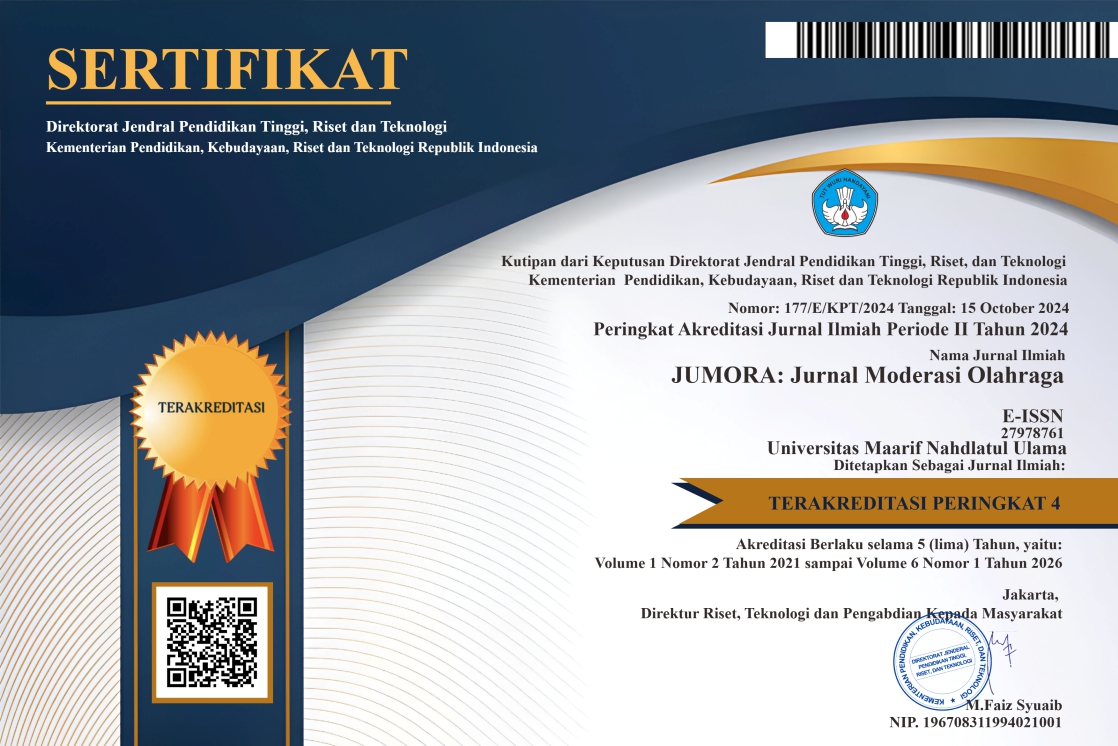Formation of Football Talents in the Education System of Germany
DOI:
https://doi.org/10.53863/mor.v3i1.607Keywords:
Education system, sports training, football, young talentsAbstract
The purpose of this study is to examine the key aspects of the talent development process in youth football within the educational system of Germany. Germany is renowned for its high educational standards and remarkable achievements of its athletes on the international stage. In order to accomplish this objective, a comprehensive set of interconnected methods, including analysis, synthesis, and generalization of scientific information pertaining to the specific issue, as well as educational and methodological literature and internet sources, were employed. The study reveals that a successful football career is the outcome of the interaction between two pedagogical systems: one that reflects an individual's educational endeavors and the other which relates to their sporting accomplishments. The step-by-step construction of the educational and sports systems, their common orientation, which enables constant multifaceted control and support of each young talent, optimally coordinates all areas of his life, promotes further harmonious development. It has been proven that the German model provides comprehensive support of the chosen professional path, the opportunity to study in the institutions that correspond to the preferences, aspirations and abilities of the individual.
Keywords: Education system, sports training, football, young talents
References
Araújo, D. & Davids, K. (2016). Team Synergies in Sport: Theory and Measures. Frontiers Psychology, 7:1449. DOI: 10.3389/fpsyg.2016.01449
Bavarian Football Association. (2022). Elite football schools in Munich and Nuremberg. https://www.bfv.de/bildung-und-foerderung/talente-und-auswahlteams/eliteschulen-des-fussballs
Breithecker, J., & Brandl-Bredenbeck, H. P. (2017). The elite school of football: a longitudinal study from a stress-theoretical perspective on the link of school and environmental sports, Discourse. Journal of Childhood and Adolescence Research, 4, 469-475. https://doi.org/10.3224/diskurs.v12i4.07
Bhaumik, G. (2022). The education system in Switzerland. https://www.expatica.com/ch/education/children-education/education-in-switzerland-100021/
Debétaz, ?. (2022). 5 Trends in Education that continue in 2022. https://hospitalityinsights.ehl.edu/education-trends-2022
Dreyer, S. (2011). Continuing Education and Lifelong Learning – What is the Quaternary Cycle? https://www.bildungsxperten.net/wissen/was-ist-der-quartaerbereich/
Edelstein, ?. (2013). The education system in Germany. https://www.bpb.de/themen/bildung/dossier-bildung/163283/das-bildungssystem-in-deutschland/
Eichendorff School. (2022). Elite schools of football. https://www.eichendorffschule.de/unsere-schule/17-unsere-schule/31-eliteschule-des-fussballs
Emrich, E., Fröhlich, M., Klein, M., & Pitsch, W. (2009). Evaluation of the Elite Schools of Sport: Empirical Findings from an Individual and Collective Point of View. International Review for the Sociology of Sport, 44(2–3), 151–171. https://doi.org/10.1177/1012690209104797
EuroEducation.net. (2022). The European Education Directory. Switzerland. Structure of Educational System. https://www.euroeducation.net/prof/switzeco.htm
Fink, ?. (2021). The history of the education system in Germany. https://www.bildungsxperten.net/bildungschannels/die-geschichte-des-bildungssystems-in-deutschland/
German Football Association. (2022a). Talent development program. https://www.dfb.de/sportl-strukturen/talentfoerderung/talentfoerderprogramm/
German Football Association. (2022b). Elite schools of football. https://www.dfb.de/sportl-strukturen/talentfoerderung/eliteschulen-des-fussballs/
Hippach-Schneider, U. (2017). Qualitative interpretation of tertiary international education statistics. P. Schlögl, M. Stock, D. Moser, K. Schmid, & F. Gramlinger (Eds.). Vocational Training, a Renaissance? Motor for innovation, employment, participation, advancement, prosperity… 324-331. Bielefeld: W. Bertelsmann Verlag. DOI: 10.3278/6004552w324
Ilyasov, R. R. (2006). Game as a subject of philosophical knowledge: ontological and epistemological aspects. (Dissertation of Doctor of Philosophy). Bashkir State University, Ufa.
Ivegesh, A. V., Naumchuk, V. I., & Ohnystiy, A. V. (2022). Peculiarities of the organization of sports training of students in elite schools in Germany and Austria. In A. Krynski (Ed.), Development of physical culture and sports amidst martial law – conference proceedings, Cz?stochowa, Republic of Poland: «Baltija Publishing», 2022. (pp. 12-16). DOI https://doi.org/10.30525/978-9934-26-253-1-2
Köller, ?., Hasselhorn, ?., Hesse, F. W., Maaz, ?., Schrader, J., Solga, H., Spieß, C. K., & Zimmer, K. (2019). The education system in Germany: existence and potential. Publisher Julius Klinkhardt.https://www.klinkhardt.de/newsite/media/20191122_9783825247850_Koeller_%20Bildungswesen_InhGlossarVorw.pdf
Light, R., & Harvey, S. (2019). Positive Pedagogy for Sport Coaching. New York: Routledge. Taylor & Francis Group.
Light, R., Quay, J., Harvey, S., & Mooney, A. (2015). Contemporary Developments in Games Teaching. New York: Routledge. Taylor & Francis Group.
Naglo, K. (2020). The social world of elite youth football in Germany – crisis, reinvention, optimization strategies, and the role of schools, Sport in Society, 23:8, 1405-1419. DOI: 10.1080/17430437.2020.1769958
Naumchuk, V. I. (2019). Characterization of the Four-Stage Structure of the Process of Learning Motor Actions in Sports Games, International Journal of Human Movement and Sports Sciences, 7(4), 81-88. DOI: 10.13189/saj.2019.070403.
Naumchuk, V. (2018). Use of mobile and educational games in the sports training of young football players. Slobozhanskyi Herald of Science and Sport, 1(63), 47-52. https://doi.org/10.15391/snsv.2018-1.008
Pill, Sh. (2020). Perspectives on Game-Based Coaching. New York: Routledge Focus on Sport Pedagogy.
Platonov, V. M. (2005). The system of training athletes in Olympic sports. General theory and its practical applications. Moscow: Soviet sport.
Reintjes, C., Porsch, R., & Im Brahm, G. (2021). The education system in times of crisis. Empirical findings, consequences and potential for teaching and learning. Muenster; New York: Waxmann. DOI: 10.25656/01:22798
Schneise, O. F. (2009). Challenge and promote talent! Concepts and structures from children‘s to top football. German Football Association. Frankfurt am Main. http://surl.li/dgvlx
Serra-Olivares, J. (Ed.). (2018). Sport Pedagogy - Recent Approach to Technical-Tactical Alphabetization. IntechOpen. Education. https://doi.org/10.5772/intechopen.71400
Shkarlet, S. (Ed.). (2022). Education of Ukraine under martial law. Informational and analytical collection. http://surl.li/cxswm
Structure of the education system in Austria. (2022). https://www.oesterreich.com/de/bildung/aufbau-des-bildungssystems-in-%C3%B6sterreich
Warubi-Sports. (2022). Soccer Academy in Germany. https://warubi-sports.com/international-soccer-academy/
Wieschemann, Ch. (2016). No license no game organization and law. https://www.bpb.de/themen/sport/bundesliga/161884/ohne-lizenz-kein-spiel/
Williams, A. M., & Reilly, T. (2000). Talent identification and development in soccer, Journal of Sports Sciences, 18:9, 657-667, DOI: 10.1080/02640410050120041
Downloads
Published
How to Cite
Issue
Section
License
Copyright (c) 2023 Volodymyr Naumchuk,Andriy Ohnystyy,Kateryna Ohnysta,Viktor Shandryhos,Andriy Ivehesh, Oleksandr Motychko

This work is licensed under a Creative Commons Attribution-ShareAlike 4.0 International License.
Authors retain copyright and grant the journal right of first publication with the work simultaneously licensed under a Creative Commons Attribution-ShareAlike 4.0 International License that allows others to share the work with an acknowledgment of the work’s authorship and initial publication in this journal











